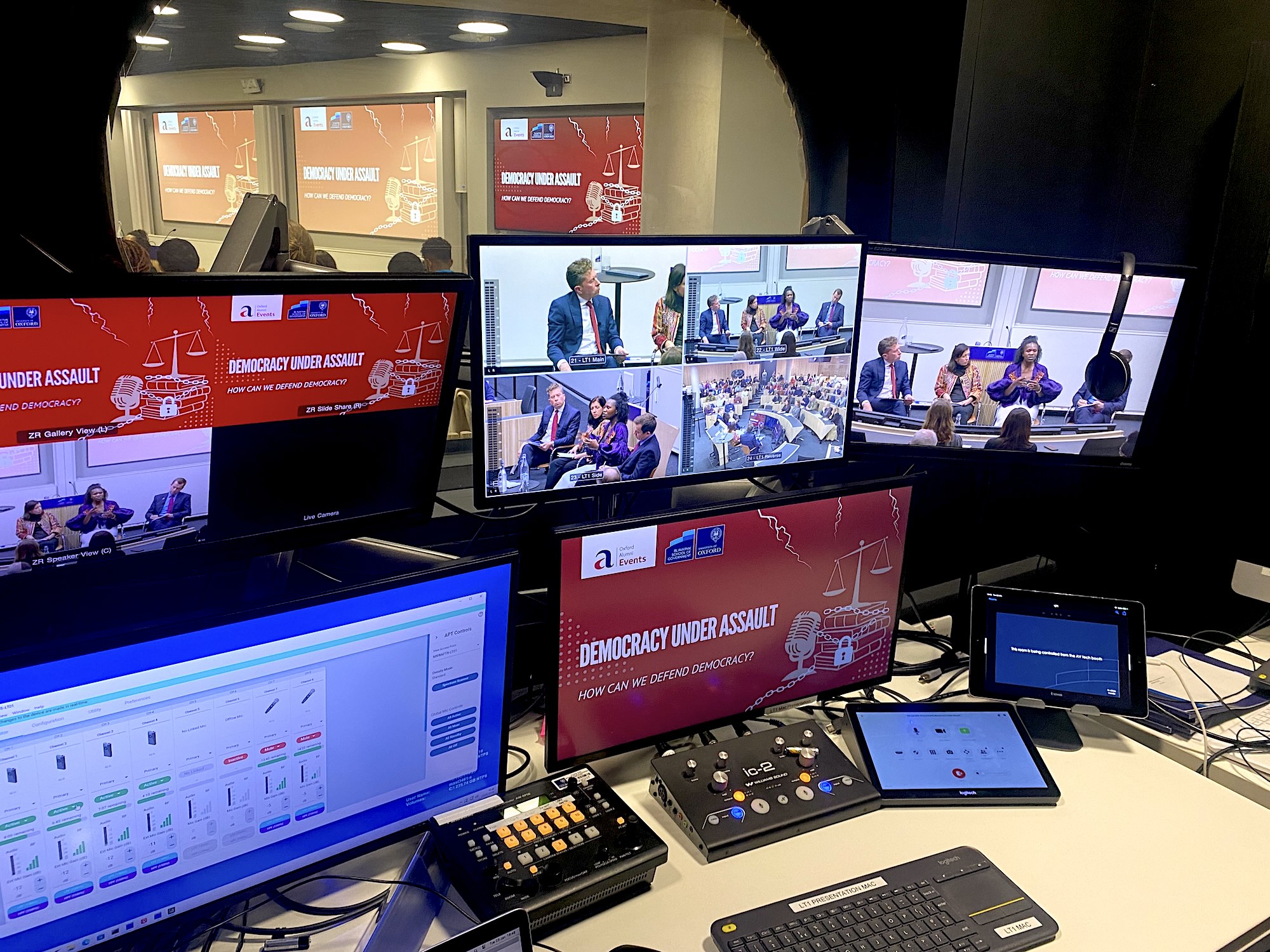Democracy under assault?

2024 will see billions across the world participate in the democratic process of electing their governing representatives, including in the US, India and the UK.
“Just because two prominent western democracies are not doing so well does not mean that the experience of democracy—particularly for the poor and most marginalised-- has changed in most countries.”
Ẹniọlá Ṣóyẹmí, Departmental Lecturer in Political Philosophy and Public Policy at the Blavatnik School, ignited the debate co-hosted at the School by the Oxford Alumni Association.
Democracy is not just defined by elections, but by the right to criticise between elections, said Maya Tudor, Associate Professor of Government and Public Policy, and this experience is worsening around the world. Pointing out that one democracy watchdog, Freedom House, weights elections as only 40% of the index, Maya argued that the right to express dissent is critical to the other 60% of its democracy scorecard. This right is under particular assault in states that seek only to ‘perform’ as democracies by holding elections while making it nigh impossible for competition to organise and critical voices to dissent. Under PM Modi, for example, India is no longer a democracy, but a hybrid regime.
Citizen engagement
My concern is whether citizens are engaged by political decision-making and committed to civic action. The IPSOS Veracity index for 2023 showed politicians as the least trusted profession across 31 countries with a net trust score of -46%. This partly reflected pessimistic views about the future in many developed economies. In 2019, a poll in France showed that only 13% of respondents thought that young people would have better lives in future, compared to 60% who did not. Many of those living in democracies feel angry and disempowered that the system is not delivering for them. This creates the conditions to erode the core institutions of democracy.
Democracy defined
Ẹniọlá suggested that democracy can be defined as people being consistently in charge of the decisions that affect their daily lives. Is this a value that is adequately sustained by current perceptions of democracy or is in decline? Is the military overthrow of an elected but corrupt government, for instance, always worse or better for a country’s democratic outcomes, and who gets to decide? This prompts the question though, of how we know those preferences when citizens disagree and whether electoral frameworks are the best way of getting at them. In response to a question on whether there had been a golden age of democracy, Ẹniọlá insisted on a degree of contextual humility. Knowing one political system (in its time or place) did not always allow us to draw conclusions about others.
Audience members were concerned about mis-/ and dis-information. If those voting were being misled, did this fatally undermine the outcome of an election? Was it not a problem if people voted in ways that were against their self-interest? The panel were troubled by the suggestion that someone else could know better than an individual what their interests were. There is a role for media companies and regulators calling out misinformation and tackling systematic and targeted disinformation, but individuals have to take responsibility for weighing the evidence that informs their voting decision.
The panel contended that any assault on democracy comes from two sources: incumbents who are seeking to tilt the political system in their favour by eroding the equal treatment of all citizens’ political rights; and citizens, and especially young people, who are questioning whether the democratic processes in their states are delivering the outcomes that matter most to them.
How can these threats be countered?
The panel urged citizens to challenge the removal of democratic rights and to foster deeper engagement in politics. Citizens should especially call out those from their political tribes who seek to limit others’ freedom of speech. They should also stand up for the independence of institutions that check executive power, even (and perhaps especially) when they disagree with those decisions.
Citizens should actively seek out those of differing opinions and listen to their views. Social media channels us towards our tribes but this encourages a politics of division not collaboration. Working together across differences while working to resolve local issues can restore faith in collective action. Citizens should press national governments to devolve power, resources and autonomy further so that more of the responses to our common challenges can be community-led.
Moderator Tom Fletcher, Principal of Oxford’s Hertford College and a former diplomat and advisor to UK Prime Ministers, reflected on his time in government. In capitals around the world, leaders and their teams would be bracing themselves to navigate the impacts of elections elsewhere. In normal times, this felt like a steeplechase: seeing the election ahead and preparing to navigate the hurdle. This year, with nearly half the world’s population seeing elections, it would be more like a rodeo as the world adapts to unpredictable events.
The debate had highlighted the importance of defending democratic values in the face of this upheaval.
Calum Miller is Senior Fellow of Practice in Public Management at the Blavatnik School.
